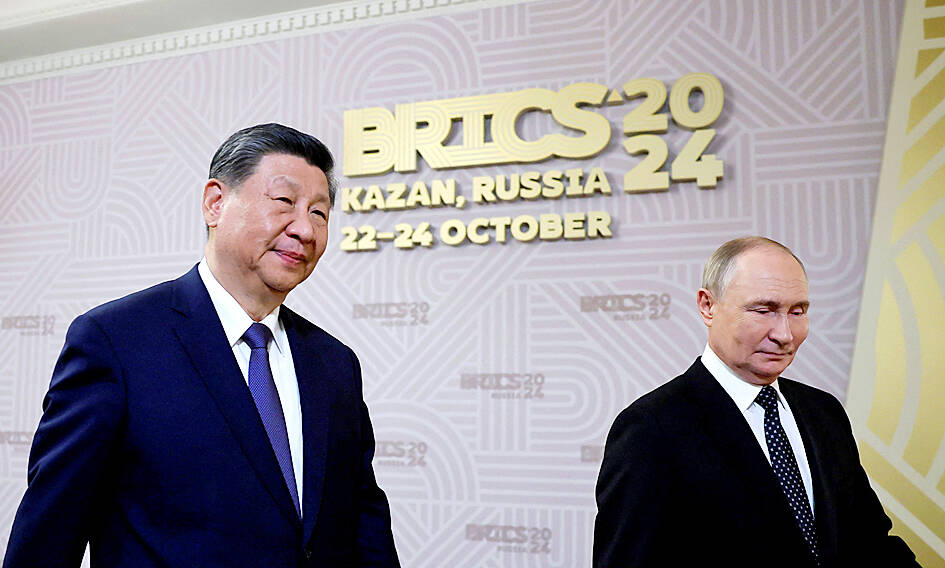Chinese President Xi Jinping (習近平) told Russian President Vladimir Putin that the international situation was gripped by chaos, but that Beijing’s strategic partnership with Moscow was a force for stability amid the most significant changes seen in a century.
Xi and Putin in May pledged a “new era” of partnership between the two most powerful rivals of the US, which they cast as an aggressive Cold War hegemon sowing chaos across the world.
“At present, the world is going through changes unseen in a hundred years, the international situation is intertwined with chaos,” Xi told Putin in the Russian city of Kazan at the opening of the BRICS summit.

Photo: Reuters
“But I firmly believe that the friendship between China and Russia will continue for generations, and great countries’ responsibility to their people will not change,” Xi said
Russia, waging war against NATO-supplied Ukrainian forces, and China, under pressure from a concerted US effort to counter its growing military and economic strength, increasingly have found common geopolitical cause.
Russia and China, pushing back against perceived humiliations of the 1991 Soviet collapse and centuries of European colonial dominance of China, have sought to portray the West as decadent and in decline.
The US casts China as its biggest competitor and Russia as its biggest nation-state threat, and US President Joe Biden has said that democracies face a challenge from autocracies such as China and Russia.
Biden has referred to Xi as a “dictator” and has said Putin is a “killer” and even a “crazy SOB” (son of a bitch).
Beijing and Moscow have scolded Biden for the comments.
Putin called Xi a “dear friend” and said the partnership with China was a force for stability in the world.
“Russian-Chinese cooperation in world affairs is one of the main stabilizing factors on the world stage,” Putin said. “We intend to further enhance coordination on all multilateral platforms in order to ensure global security and a just world order.”

MORE VISITORS: The Tourism Administration said that it is seeing positive prospects in its efforts to expand the tourism market in North America and Europe Taiwan has been ranked as the cheapest place in the world to travel to this year, based on a list recommended by NerdWallet. The San Francisco-based personal finance company said that Taiwan topped the list of 16 nations it chose for budget travelers because US tourists do not need visas and travelers can easily have a good meal for less than US$10. A bus ride in Taipei costs just under US$0.50, while subway rides start at US$0.60, the firm said, adding that public transportation in Taiwan is easy to navigate. The firm also called Taiwan a “food lover’s paradise,” citing inexpensive breakfast stalls

US PUBLICATION: The results indicated a change in attitude after a 2023 survey showed 55 percent supported full-scale war to achieve unification, the report said More than half of Chinese were against the use of force to unify with Taiwan under any circumstances, a survey conducted by the Atlanta, Georgia-based Carter Center and Emory University found. The survey results, which were released on Wednesday in a report titled “Sovereignty, Security, & US-China Relations: Chinese Public Opinion,” showed that 55.1 percent of respondents agreed or somewhat agreed that “the Taiwan problem should not be resolved using force under any circumstances,” while 24.5 percent “strongly” or “somewhat” disagreed with the statement. The results indicated a change in attitude after a survey published in “Assessing Public Support for (Non)Peaceful Unification

The CIA has a message for Chinese government officials worried about their place in Chinese President Xi Jinping’s (習近平) government: Come work with us. The agency released two Mandarin-language videos on social media on Thursday inviting disgruntled officials to contact the CIA. The recruitment videos posted on YouTube and X racked up more than 5 million views combined in their first day. The outreach comes as CIA Director John Ratcliffe has vowed to boost the agency’s use of intelligence from human sources and its focus on China, which has recently targeted US officials with its own espionage operations. The videos are “aimed at

Four former Hong Kong opposition lawmakers jailed in the territory’s largest national security case were released yesterday after more than four years in prison, the first among dozens convicted last year to regain their freedom. Former legislators Claudia Mo (毛孟靜), Jeremy Tam (譚文豪), Kwok Ka-ki (郭家麒) and Gary Fan (范國威) were part of a group of 47 public figures — including some of Hong Kong’s best-known democracy advocates — who were charged with subversion in 2021 for holding an informal primary election. The case fell under a National Security Law imposed on the territory by Beijng, and drew international condemnation and warnings